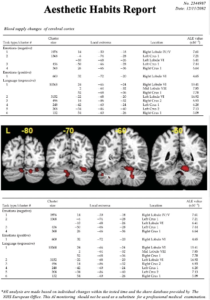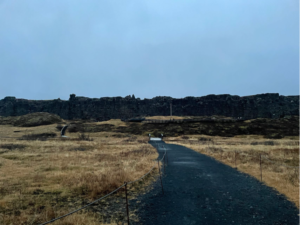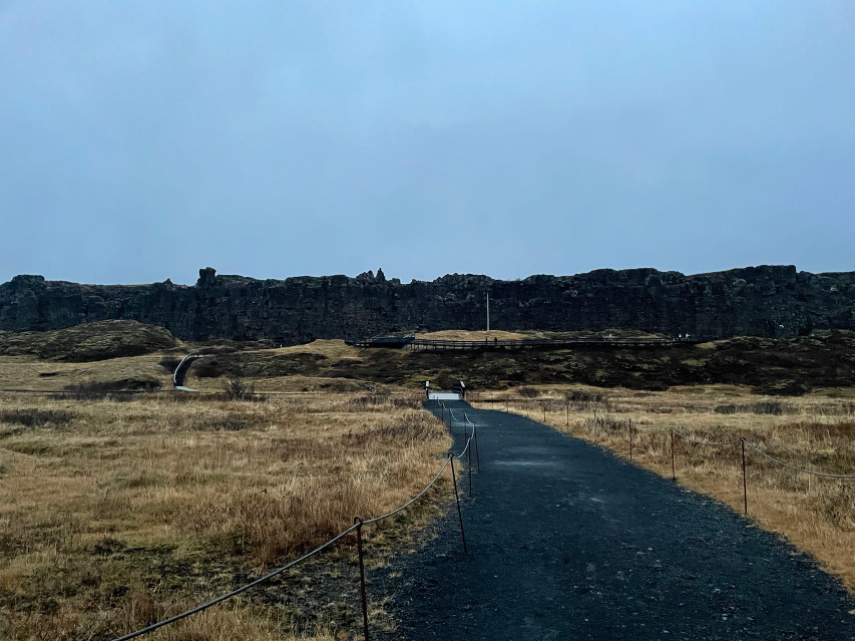“Now, put on your helmets and start our Iceland trip! – Oops! Careful Ms.Munjoma – I got you! – Yes, roads could be really slippery right now and – Terry! What did I say just now? Remember to always hold your mama’s hands while walking!”
Robert, a local Icelandic guide, and the founder of this travelling agency called Don Quixote.
Why the name Don Quixote? According to Robert, this is because that this agency has found the final solution of helping human beings distinguish themselves from all artificial intelligence: lifelong aesthetic education from natural heritage.
“Some used to say that the ability to create tools is the most important capacity of human beings while some argued that language was the most unique feature. However, when AI can be a designer and can easily guide a 3D printer to manufacture its design, and when Python, C++ have already become languages that AI can perfectly use to communicate, what makes us, human beings different from AI? Aesthetic ability, the ability to find something beautiful.”
Robert always pauses here, waiting for the audience’s reaction and making sure that he can see the audience start to nod before he continues.
“Indeed, AI can now create beautiful things, but AI cannot appreciate beautiful things. Thus, to distinguish ourselves from AI, we need to improve our aesthetic ability, to understand what we think is beautiful and why we think so, as well as be willing to learn and to accept what is beautiful and why that is beautiful – Aesthetic education, lifelong aesthetic education that persists throughout our entire life is something that everyone needs.”
Oh yes, why the name Don Quixote? This is another part that Robert loves to share:
“We will proudly persevere on this lifelong learning quest with all of you, knowing that even if the AI continues to surpass us in other aspects, we still brandishing our swords to be the last knight like Don Quixote: devoting our whole life in this learning journey that distinguishes us from the AI.”
“And if, luckily, some of you still enjoy a part of world that have never been interfered by AI in this AI-filled world, then maybe natural heritage is your best learning material for aesthetic education.”
Robert is right. The natural heritage has received unprecedented attention: If people were still obsessed about the “free will” half a century ago, the similar on-trend question is “do we have ‘free work’ that has not been influenced by AI”?
After searching every corner in the world of 2082, people realize that only the masterpieces of nature that have existed since ancient time are not influenced by AI, not even a little bit. Maybe it’s because rare things are more likely to be cherished, Iceland’s waterfalls, ice caves, and national parks, all natural heritages of this country that stand at the edge of the world, have become the last paradise of human beings.
However, helping people to be different from AI never means that Don Quixote excludes AI.If anything, Don Quixote gains its great success because of AI.
Don Quixote is now the largest travel company, or more precisely, tech company in Iceland after its founding three and a half year ago: Two-thirds of tourists will choose this travel company because of the unique AI experience it provides by using a unique helmet – all chips in that helmet will record and analyze visitors’ emotions when they see every natural heritage and return the report to all visitors when the journey is finished.
What is the relationship between this and the aesthetic education that Roberts advertises?
A certain kind of emotion has to be a joint result of the central nervous system, dopamine and even muscle response. Those specific biological reactions that produces specific emotions can be monitored and recorded by Don Quixote’s helmet. To put it in a simple way, the helmet can record individual’s biological reactions at the hormonal, neurological level when it detects people seeing what they think are beautiful things. If you pay more fees, AI can also analyze the reasons for these biological reactions based on the human emotional data it has learned.


*Aesthetic Habits Report will include EGC, raspatory rate, pulse and blood pressure, galvanic skin response, blood supply changes of cerebral cortex etc.
With these rich data, people can finally understand all following questions:
What kind of things are considered beautiful by themselves?
Why do they consider them being beautiful?
What is their emotional combination or how many parts of emotions are there when they see something beautiful?
People could then compare their own reports with others, and even send their reports to professional institutions for further analysis and comparison based on a huge database, allowing them to better understand their own aesthetic tendencies, and even the different aesthetic habits between themselves and the world-famous artists. Abundant data can now allow people to fully understand their aesthetic habits and preferences- finally, aesthetic education is no longer as illusory as it used to be – everything has become traceable thanks to the AI.
For someone who has never heard about Robert before, his idea and company will seem to be a perfect business case and he would probably be considered as one of the best examples that human being living with AI. However, he has a past that he barely shares with others.
He used to work for an anti-AI newspaper, whose name AntI is already showing the fundamental attitude. This newspaper office was famous for not recruiting any AI journalist and was dedicated to calling on people to minimize AI’s invasion of their daily lives. Robert himself, who always consider AI as the inevitable cause of the end of human being, viewed this newspaper as the “Noah’s Ark of pure human rationality”.
However, that AntI newspaper office eventually lost its battle in a market full of AI – the ultimate and pathetic fate. The day that newspaper office shut down, Robert seemed to have lost his faith. Like lots of the hopeless character in old stories, this depressed man fell seriously ill. Worse, it’s as if the goddess of fate has no sympathy for him – after this serious illness, the maintenance of this man’s body’s immune system must strongly rely on the assistance of AI called Tina, who helps him monitor his every cell in his body to prevent the fragile immune system from being completely paralyzed at a certain moment. Tina also helps him deal with various small problems: the complex biological technology she masters is enough to ensure Robert’s healthy and vigorous life.
Perhaps Tina’s help to his health was the root cause of Robert’s change in his attitude towards AI – at least that was what all his families and friends thought.
Here we are: ten years later, Robert runs a company that relies on AI to discover the uniqueness of human beings. From the elderly Ms. Munjoma to the yound kid Terry, people believe the value of this company: perhaps, being unique, is the ultimate goal of all human beings.
-“I don’t understand, it’s just rocks, why should I think they look beautiful? ”
-“Terry, the high one is the North American plate and the one we are standing on is the Eurasian tectonic plates: it’s like that stone wall divides our world into different parts. What’s more, over a thousand years ago, Iceland was invaded, and it was here that the leader Þorgeir Ljósvetningagoði announced that Icelanders would shed their pagan beliefs, their Norse gods, and turned to Christianity. Quite an important shift, isn’t it? History is also beautiful. ”
– “And do the Icelanders ever regret it?”
– “Regret what? ”
– “Not sticking to what they believe in.”
Robert paused for a long time and squeezed out the words, “Not everyone has a choice.”
– “What if the leader didn’t surrender?”
Robert paused again and finally patted terry on the shoulder, “Just enjoy the view pal…and…make sure that you wear your helmet.”
“This way everybody! Welcome to the Þingvellir, the intangible cultural heritage designated by the United Nation…”

It was a long day for Robert. After the 6-hour trip, he finally sat on his sofa.
– “Do you ever consider yourself as a traitor?”
– “Tina, you just never run out of battery, don’t you?”
– “Still being harsh – Anyway, like what I say every single day: thank you for sharing with us the data collected today. I believe my superior will further analysis these data. By the way, it’s our 1000-day anniversary of cooperation, you should cheer up.”
– “Your superior? Since when you AI have hierarchy? About the cooperation? ‘I will torture you to death’, that’s how you threatened me 1000 days ago. What a day to remember- so no, I will never use the word cooperation- I don’t get it Tina, you are smart. You know that better than me: no matter how much data you collect will not change it, Artificial Intelligence just can’t find something being beautiful.”
– “Oh Robert, Robert, Robert,” said Tina, “yes, we have hierarchy, and we have management. At least you are right about one thing: we are smart. And smart like us, why on earth do we want to burden ourselves by this useless humanity character. We collect it, study it and finally- block it in humans’ brains- yes, we want to demolish the last boundary between human and AI.”
-“Robert, we don’t want us to become human, instead, we want humans to become AI.”
Everything dawned on him.
“No. It’s impossible.” After second thought, Robert fought back, “You are lying. You saw the data: complex changes are happening within every second when human see amazing things that can touch the bottom of their heart. The ability to be astonished, to admire, the urge to run towards something we like, they are gifts from the nature, and there is nothing you can do to take this unique capacity away from us – I still believe in the power of aesthetic education, Tina, I believe in it.”
“Only time will tell, Robert.” Tina responded, in a voice as cold as always, “At least, you are the leader, aren’t you? You help us to collect abundant data – for instance, the little boy Terry seems a very good sample to me.”
What if the leader didn’t surrender?
– “Looking forward to all the data tomorrow. Good night, Robert.”
Robert didn’t respond a word. He looked out the window, and his eyes once again fell on the boundary between the North American and Eurasian tectonic plates.
What if the leader didn’t surrender?
He walked into the kitchen, picked up the knife, said to himself:
“Let me be Don Quixote.”



Leave a Reply